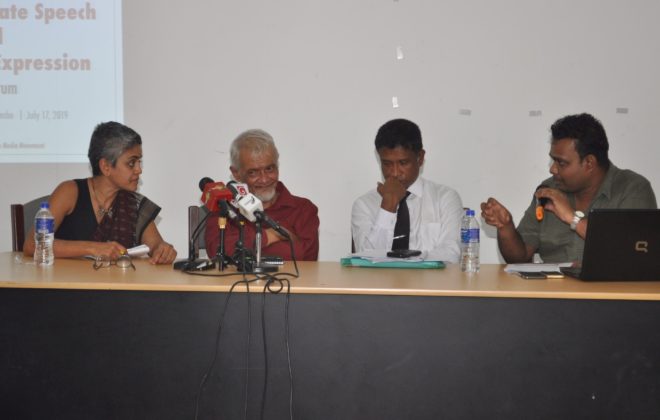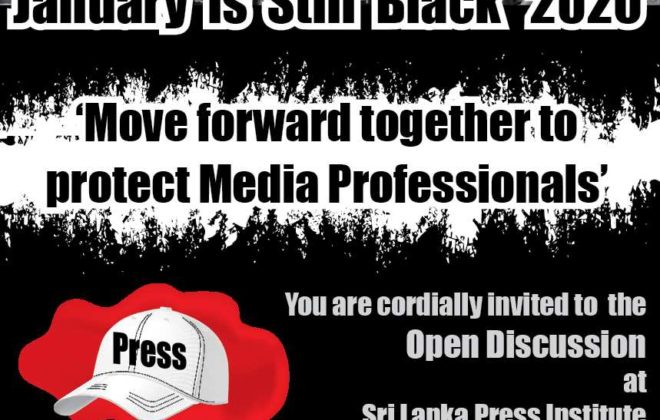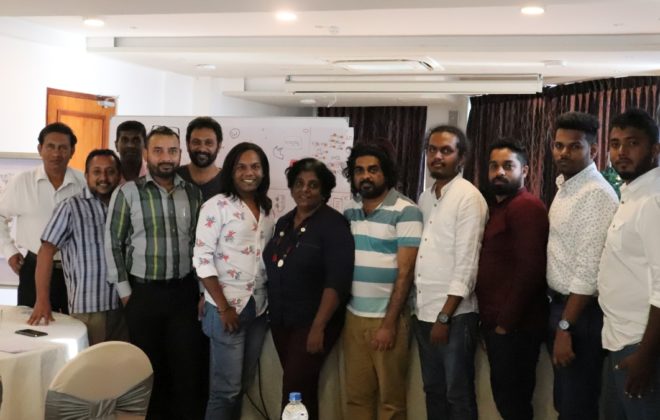Thirty sections of the 20th amendment to the constitution are against democracy and freedom of expression – Ermiza Tegal, Attorney-at-law
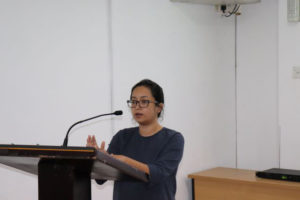 Rights activist Ms. Ermiza Tegal, Attorney-at-law, pointed out that 30 sections of the 20th amendment to the constitution are contrary to democracy while three of them directly contradict the freedom of expression. The 5th article of the 20th amendment, which is related to immunity of President from suit makes no proceedings shall be instituted or continued against the President in case of violation of civic rights. The 24th article paves the way for urgent bills, and the 20th article proposes amendments related to the Election Commission. The above-mentioned articles have a direct impact on the freedom of expression, Ermiza Tegal highlighted.
Rights activist Ms. Ermiza Tegal, Attorney-at-law, pointed out that 30 sections of the 20th amendment to the constitution are contrary to democracy while three of them directly contradict the freedom of expression. The 5th article of the 20th amendment, which is related to immunity of President from suit makes no proceedings shall be instituted or continued against the President in case of violation of civic rights. The 24th article paves the way for urgent bills, and the 20th article proposes amendments related to the Election Commission. The above-mentioned articles have a direct impact on the freedom of expression, Ermiza Tegal highlighted.
Counsel Ermiza Tegal who appeared for the petitions against the 20th amendment to the constitution revealed these facts at a discussion forum of the journalists on ‘Democracy, Freedom of Expression and the 20th Amendment’ held on 06 October 2020 at the auditorium of the Sri Lanka Press Institute in Narahenpita, Colombo. Journalists and media activists attended the forum organized by Free Media Movement (FMM).
Speaking further, Ermiza Tegal explained how the 20th amendment would impact on democracy and freedom of expression.
“The 5th article of the 20th amendment says that no proceedings shall be instituted or continued against the President in any court or tribunal in respect of anything done or omitted to be done by him either in his official or private capacity. This article removes the provisions of the 19th amendment which removed the blanket immunity the President enjoyed from legal proceedings, The actions by President that amount to the violation of the rights of a citizen can be examined before the judiciary. Legal actions by Sandya Ekneligoda against President Maithripala Sirisena concerning the presidential pardon provided to Ven Galagodaaththe Gnanasara Thero was enabled by the 19th amendment. 20th amendment to the constitution will remove this provision further empowering the President. The probability of violation of people’s rights increases when the President is granted fullest immunity from the constitution. The citizens cannot seek redress from the judiciary in such a backdrop.
“People elect the President and the parliament, but the citizens never alienate their rights. Therefore, the citizens have the right to question the violation of their rights by the elected representatives. It is an unswerving power that is inalienable. Citizens can take legal action against officials from the Grama Seva Niladhari to the President in case of violation of their rights. Citizens will have no right to make the President accountable if the 20th amendment is passed.
According to the 24th article of the 20th amendment, the cabinet can propose a bill as an urgent one. The judiciary has to decide the constitutionality of the amendment within 24 hours, and the citizens only have 24 hours to challenge the bill in the courts. The President can extend the period up to three days, but at present, the time limit is seven days. We have to consider the fact that the urgent bills are mooted by the cabinet and not by the parliament.
“The Secretary-general of Parliament once said at a programme on transparency that 128 such urgent bills were moved in parliament between 1978 and 2011. Some of such urgent bills were Prevention of Terrorism Act, University Act, Consumer Protection Act, Local Government (Special Provisions) Act, Narcotic Drugs and Psychotropic Substances Act, Finance (Amendment) Act, Value Added Tax Act, Excise Act and Infrastructure Development Act. The urgent nature of such acts is questionable. Judiciary has also pointed out the shortcomings of these urgently passed acts and said it is a violation of rights. However, the judiciary can only mention them, and no other action can be taken to rectify them.
“In other countries, the citizens can complain against the violation of rights even after the Act is passed, and it is called post-enactment judicial review. Sri Lankans have never enjoyed this right. Our constitution provides only minimal time frame to challenge a bill. However, citizens in remote areas like Batticaloa need more than 24 hours to file a petition against an urgent bill.
“We have the problem of insufficient time to go to court in terms of an urgent bill related to the press freedom and freedom of expression.
“The 20th article of the 20th amendment states that the owners of state and private media institutes are bound to follow the guidelines of the Election Commission. However, the Election Commission is appointed by the President. A parliamentary council will replace the present constitutional council as per the 20th amendment. A commissioner appointed by the President will issue the media guidelines, and accordingly, we can imagine how the guidelines may impact the freedom of expression,” Ermiza Tegal said.
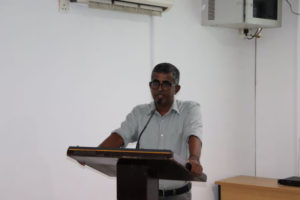 Editor-in-Chief of Anidda newspaper K.W. Janaranjana, Attorney-at-law, said that the pressure on democracy imposed by the 20th amendment would extend to the freedom of expression.
Editor-in-Chief of Anidda newspaper K.W. Janaranjana, Attorney-at-law, said that the pressure on democracy imposed by the 20th amendment would extend to the freedom of expression.
“The democracy we have been developing and protecting with many efforts will reverse an entire era if the 20th amendment is passed as it is.
“Only the political views regarding the 20th amendment were propagated among citizens creating a gloomy picture about the 19th amendment. Some tried to highlight that 19th amendment was the reason for the Easter Sunday attack although the two has no interdependence. Another message was that the 19th amendment was the cause for the clash between the President and the Prime Minister during the period between 2015 and 2019. However, the conflict was due to the suspicion, greed for power and class factor between these two leaders, and it had no connection to the 19th amendment. Another false argument is that a power circle was created centring the position of Speaker in the parliament. Although the Speaker chaired the Constitutional Council, the position never emerged as a power centre of the state.
“Another baseless argument is that the Inspector General of Police cannot be removed because of the 19th amendment. However, there is the Removal of Officers (Procedure) Act, No. 5 of 2002 regarding the removal of the Inspector General of Police. The past or the present governments have not acted to remove the Inspector General of Police using this Act. Media reiterated the lies planted by the politicians to argue that the 19th amendment is detrimental. I think the media persons are reporting the statements by the politicians because the politicians have demarcated their boundary of thought. The journalists lack their own evaluation on the 20th amendment,” K.W. Janaranjana stated.
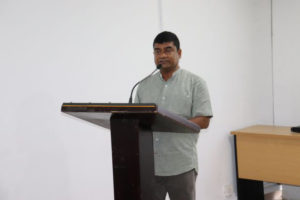 Speaking about the path of the 20h amendment at the forum, Counsel Jagath Liyanaarachchi pointed out that the core of the 20th amendment is a threat to democracy, freedom of expression as well as press freedom. He pointed out that the 20th amendment would narrow many of the fundamental rights of the people while the parliament is also relinquishd of powers.
Speaking about the path of the 20h amendment at the forum, Counsel Jagath Liyanaarachchi pointed out that the core of the 20th amendment is a threat to democracy, freedom of expression as well as press freedom. He pointed out that the 20th amendment would narrow many of the fundamental rights of the people while the parliament is also relinquishd of powers.
At the outset, clarifying the aim of the discussion, Convenor of Free Media Movement Seetha Ranjanee highlighted the probability of silencing the parliament covering to COVID-19 and getting the 19th amendment passed. She recalled that Free Media Movement had already declared the 20th amendment a threat to democracy and press freedom, in its statement on 16 September.
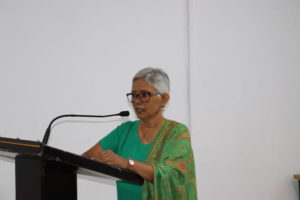 “We have questioned the risk of independent commissions losing independence and the negative effects of withdrawing the powers of the Constitutional Council to nominate members for the independent commissions. We highlighted the ill effects of President having absolute powers of making all major appointments in public service and removing them,” Seetha Ranjanee said.
“We have questioned the risk of independent commissions losing independence and the negative effects of withdrawing the powers of the Constitutional Council to nominate members for the independent commissions. We highlighted the ill effects of President having absolute powers of making all major appointments in public service and removing them,” Seetha Ranjanee said.
Download Full Report [Sinhala]


